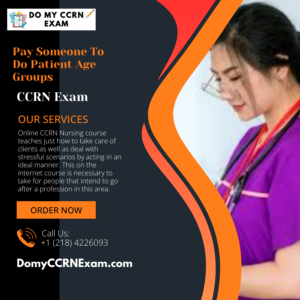Can Someone Do My Patient Age Groups CCRN Exam
CCRN Certification is an invaluable asset to nurses looking to advance in their careers, as it allows them to secure higher salaries and work in more specialized areas.
Participating in a review course can help ensure you pass an exam the first time and establish productive study habits.
Nursing Academic Exam Help
An CCRN certification is an outstanding way to demonstrate your expertise in critical care nursing, offering professional benefits such as higher pay and greater opportunities for promotion or admission into graduate programs. Furthermore, it demonstrates to patients and colleagues alike that you possess the knowledge and abilities needed to provide care for critically ill patients.
The Certified Critical Care Nurse Exam (CCRN Exam) spans three hours and comprises 150 multiple-choice questions; 25 are unscored while the remainder focus on either adult, pediatric, or neonatal patient populations. As this exam follows the American Association of Critical Care Nurses Synergy Model for Patient Care framework, familiarizing yourself with this model prior to sitting the exam is vitally important.
To be eligible to sit the CCRN examination, an RN must have at least 1,750 Clinical Directly caring for acutely/critically ill adult patients or 2,000 hours in critical care, along with an unencumbered and in good standing RN or APRN license, plus supervisor contact info so your hours can be verified.
Nursing Paper Writing
CCRN certification is the pinnacle credential in critical care nursing. It proves your knowledge and expertise within this specialty field and offers numerous advantages for patients, employers, and yourself alike.
As you prepare for the CCRN exam, be sure to dedicate extra time and energy to answering more difficult questions. These are those that have the greatest effect on your score so make sure to study these thoroughly.
Practice tests for the CCRN exam can also be an invaluable way to help prepare, but it is important to remember that their answers may differ from those on the actual test. Also, simply reading an explanation isn’t enough – understanding all concepts related to any question before answering will ensure you can respond appropriately and understand it all.
Nursing Exam Preparation
Earning your Critical Care Registered Nurse (CCRN) credential through the American Association of Critical-Care Nurses is an honor and a mark of your expertise and dedication to critical care nursing, showing employers and patients alike that you have invested the necessary effort into becoming qualified to work with these complex cases.
To take the Certified Clinical Research Nurse exam (CCRN exam), applicants must possess an active, unencumbered RN or APRN license that is valid within the US and have completed at least 2,000 hours of direct bedside patient practice within one year before application – of which at least 144 should focus on adult patient population for which certification will be sought – this must also be verified by clinical supervisor.
Within your three-year certification period, you must also earn at least 100 Continuing Education Recognition Points (CERPs), spread among categories A-C. The majority of your CERPs should come from Category A as this will relate most directly to critical care nursing patient populations that you wish to become certified for.
Nursing Exam Execution
Certification as a Critical Care Registered Nurse (CCRN) can demonstrate to patients, colleagues, and employers that you specialize in critical care nursing. In addition to adding more credibility to your resume and career opportunities such as promotions or acceptance into graduate nursing programs, earning this designation often means higher salaries for CCRNs than non-CCRN nurses.
The Certified Clinical Registered Nurse exam takes three hours and contains 150 questions; 25 unscored ones allow you to practice without risking your job. Most questions address Clinical Judgment for specific patient populations while some involve professional caring practices.
Nurses looking to renew their CCRN certification must fulfill the Renewal by Synergy CERP program requirements and practice in one of three eligible pathways – direct patient care, tele-critical care or knowledge professional. Nurses should maintain documentation proving continuing competency compliance such as original certificates of completion or contact hour certificates.





